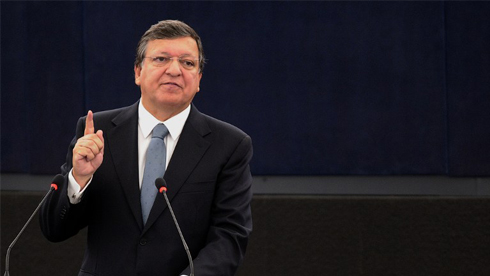The State of the Union "is a major event of the European year," says Belgian editorialist Maroun Labaki, writing in daily Le Soir "It is a chance to look further, to speak to history. It is a political manoeuvre, an exercise in communication: José Manuel Barroso has shown in the past that he can excel at this," he says. Yet, this time, the paper is not convinced:

in Strasbourg, José Manuel Barroso nonetheless totally failed his speech. It sounded like any old speech – and there are plenty of those. Eight months before the European elections, routine is not a response to the disarray of many Europeans, and to their growing disaffection towards Europe. [...] We may be witnessing the end of the European project. The idea is dizzying... Yet, yesterday we surely witnessed the beginning of the end of José Manuel Barroso.
Writing in German daily Süddeutsche Zeitung, Cerstin Gammelin is even more severe, attacking both the form of the speech and the Commission President's "dispiriting heritage" –

He defended the Commission's successes as if he were reading a shopping list. Barroso, usually a good, fiery orator, seemed, at the end of his mandate, much like the Commission over which he presides: discouraged and uninspired. The weaknesses of the Barroso Commission are not all his fault but are also due to the circumstances his administration had to face. Europe went through its worse crisis since it was created. [...] But even when Barroso was responsible, he was unconvincing. He lost his chance to make his institution a powerful counter-weight to the member states. And he renounced making his last speech a flamboyant campaign speech. Instead of an address to European citizens, those who will have a say in determining the next commission president through the [May 2014] European elections, Barroso remained stuck on technical details. The head of the most important institution in the EU was unable to deliver a message to interested voters. The Commission President no longer dares talk directly about EU problems. His analysis of the problem – citizens are turning their backs to the European project – is not followed by a way to solve it. The image of Europe that came out of the plenary session this Tuesday in Strasbourg was as mournful as the atmosphere in the chamber. The Commission was founded to ensure that within the single market all would work smoothly. Today, after 10 years under Barroso, it is weaker than it ever was. Back then, the Commission was a reliable institution for the southern countries. Today, citizens tend to trust national authorities. [...] This is dangerous because the single market is, excepting all projects of political union, the guarantee of trust that links the 28 member states. The Commission controls this market and can make it tremble, it shakes up the foundations of the EU. Europe cannot afford a second president like Barroso.
Gazeta Wyborcza columnist Tomasz Bielecki notes Barroso’s words: “There are many out there, who always like to nationalise success and Europeanise failure,” before observing that –

Even though Barroso is quite right in his defence of Brussels (and, consequently, of himself), he’s doing a poor job passing on this message to ordinary citizens. The crisis, which - in his own words - is not over yet, has contributed to the growth of Euroscepticism on both the left and right of the political spectrum. [...] The May 2014 European elections will be a major test for this crisis-fuelled Euroscepticism. Usually, European issues are not at the centre of the election campaign, national issues are. But this time, it may centre on solutions for Europe – because of the crisis. For Dutch socialists, the EU’s anti-crisis measures are only a confirmation that the Union is a Trojan horse of heartless, neo-liberal capitalism. The British Tories – whom Barroso accused of copying the anti-EU United Kingdom Independence Party – consider Brussels' bureaucratic aspirations as the risk for the country’s sovereignty and unrestrained economic growth. The EU is not trusted by as much as 72 per cent of the Spaniards (compared to 24 per cent six years ago), 58 per cent of the Germans, 56 per cent of the French, 53 per cent of the Italians, and 42 per cent of the Poles (18 per cent in 2007). The elections to the European Parliament in May 2014 will prove a great test for the crisis-driven Euroscepticism. Usually the campaign themes do not centre around pan-European issues, but internal disputes. But this time it can focus on fixing Europe. Due to the crisis (and the controversies around recipes how to overcome it), Europe has now become a theme much discussed - as Barroso put it - “in coffee houses and on popular talks shows”. Hence his appeals to pro-European politicians to take a bold stance in defence of European integration. That is why, unfortunately, it may well turn out that the Eurosceptic wave of 2014 will have to be opposed by someone quite uncharismatic and no stronger or more decisive than José Manuel Barroso.
Was this article useful? If so we are delighted!
It is freely available because we believe that the right to free and independent information is essential for democracy. But this right is not guaranteed forever, and independence comes at a cost. We need your support in order to continue publishing independent, multilingual news for all Europeans.
Discover our subscription offers and their exclusive benefits and become a member of our community now!












